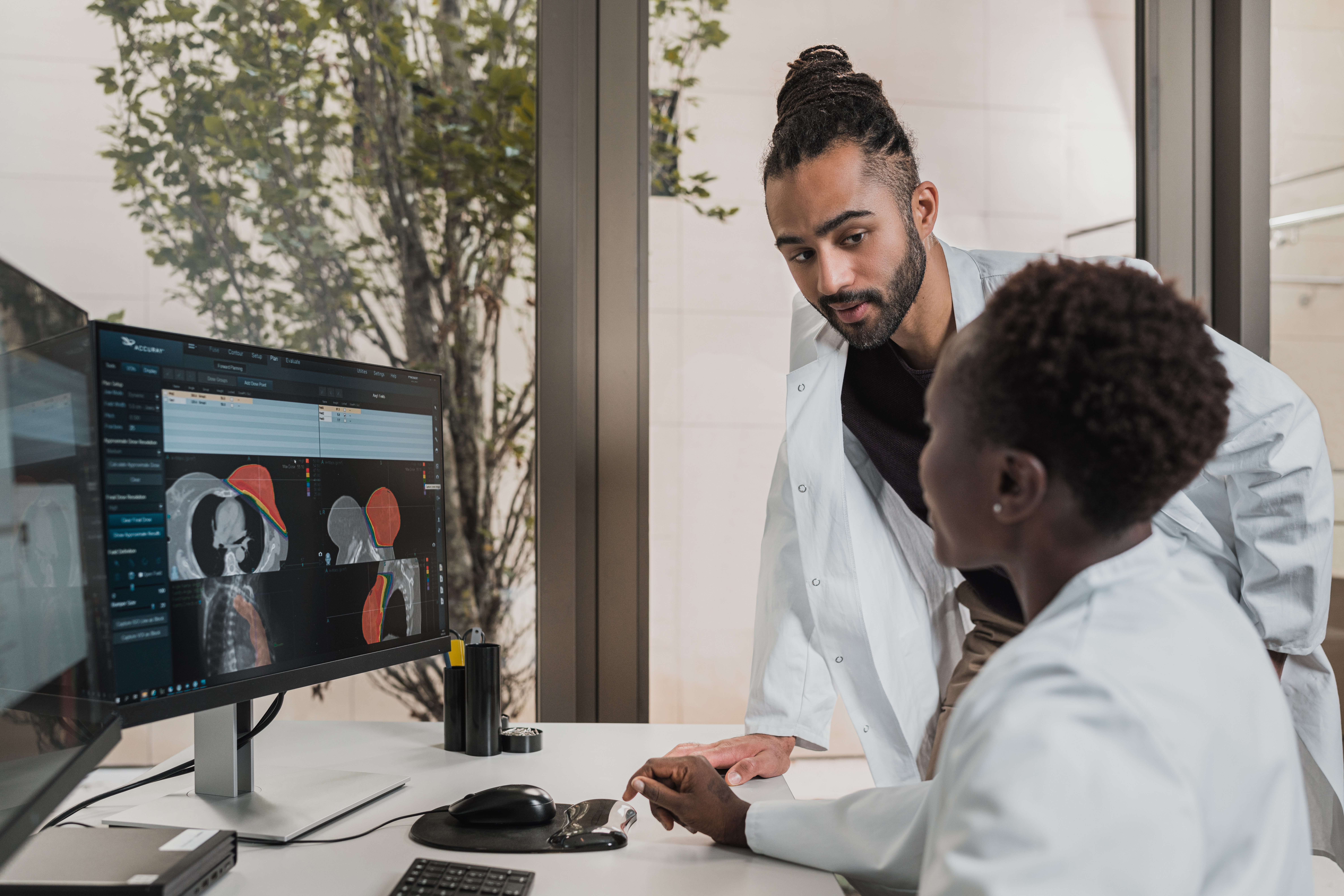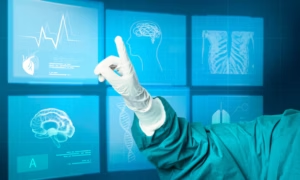What Are Examples of Artificial Intelligence in Healthcare?
From using chatbots for information delivery to shouldering the workload off of physicians, here are nine answers to the question, “What are the best examples of artificial intelligence in healthcare?”
- Chatbots
- Big Data Analytics
- Advanced Analysis of Medical Images
- AI Tutoring
- Skin Cancer Detection
- Machine Learning Algorithms
- Automatic Ultrasonography
- Record Management
- Workplace Assistants
Chatbots
One example of artificial intelligence in healthcare is using chatbots to provide information about medical conditions and treatments. Using chatbots, you can receive a recommendation about remedies, receive support and advice, and ask questions regarding medical conditions. It helps to free up healthcare providers’ time, enabling them to focus on more complex tasks and improving the efficiency of healthcare delivery.
As AI technology continues to evolve, it will undoubtedly play an even more significant role in healthcare in the future. AI can help us make better patient care, safety, and treatment decisions by providing insights that would be impossible to glean from data alone.
Curtis Anderson, Co-founder and CEO, Nursa
Big Data Analytics
The extensive analysis of health data is one of the most important things we need to do to improve diagnosis and treatment for various ailments. The rise of AI in big data analysis could provide a much-needed impetus toward this.
We are already seeing AI tools being used to analyze thousands of medical records and other types of data to find unique patterns. This will ultimately make it easier for healthcare professionals to diagnose diseases much faster and more accurately.
It will also help with medical research, including finding new therapeutics, optimizing existing ones, and fine-tuning medicine to become more responsive to emerging healthcare challenges.
Erik Pham, CEO, Health Canal
Advanced Analysis of Medical Images
Images are an integral part of the entire medical diagnosis process. Whether it’s a CT or an MRI scan, these images help physicians and caregivers pinpoint medical issues.
However, relying solely on the human eye for analysis is not always efficient.
As a result, we are now seeing the deployment of AI tools to help with image analysis and proper diagnosis. The good thing about AI tools is that they are 100% thorough. They can look through images and identify issues that a normal human eye could have missed.
In addition, AI image analysis can do a series of comparative analyses of thousands of scans and try to identify patterns that can help physicians better understand certain ailments. Furthermore, it takes a fraction of the time to analyze these images compared to normal human analysis.
Logan Nguyen, Co-founder, MIDSS
AI Tutoring
My company specializes in online medical emergency certifications for nurses and healthcare workers. We also have a medical library available for developing countries at no cost. We have been able to design and implement an AI tutor that helps healthcare personnel study for their online certifications and assists developing countries’ medical staff in understanding basic emergency medical services.
Our AI tutor uses machine learning algorithms to absorb the curriculum and feedback from many of our medical staff to act as a virtual study guide for our customers. This has been incredibly valuable, as we have refined the information pool our AI system has to draw on. It also saves us a lot of time without hurting our overall customer experience.
Brian Clark, CEO and Marketing Director, United Medical Education
Skin Cancer Detection
One example of artificial intelligence in healthcare is its use for skin cancer detection. AI-based algorithms can analyze images taken by dermatoscopes and can be trained to detect malignant lesions better. This technology provides a more accurate diagnosis and reduces the time spent on assessments, while increasing accuracy, as AI-based systems can recognize patterns in images that may be too subtle for human interpreters. AI technology can help clinicians identify false positives at an earlier stage and reduce the number of unnecessary biopsies by up to 40%.
AI-based models have been developed that combine clinical data, such as patient history, with machine learning algorithms to predict the likelihood of a patient developing melanoma or other skin cancers. These models can provide doctors with critical insights into a patient’s risk profile, allowing them to provide more targeted treatments and interventions.
Sarah Gibson, Director, Proactive Healthcare
Machine Learning Algorithms
One example of artificial intelligence in healthcare is the use of machine learning algorithms to predict diseases and make treatment recommendations. Machine learning algorithms can analyze large amounts of patient data, such as medical images, lab tests, and even electronic health records, to detect patterns and make predictions about disease states.
Amy Lee, Medical Advisor, Nucific
Automatic Ultrasonography
Using ultrasonography to see and assess heart function has become standard in cardiac care. It is typically the initial imaging method employed in making a clinical diagnosis nowadays.
Nevertheless, ultrasound’s major drawback is how dependent it is on the operator. There are a few metrics that are standard for every echo exam, but taking them can be tedious and subject to a lot of variation across users. Along with the other instances of AI in healthcare presented here, we may eliminate this type of manual and repetitive work with the help of AI.
Automatic measures based on AI may provide quick and repeatable echo quantification, which benefits both patients and doctors. By accepting or adjusting measures based on their clinical judgments, healthcare providers get a powerful tool to improve their knowledge and stay in control of diagnostic choices.
Shakzod Khabibov, Founder, Natura Market
Record Management
I have a personal experience with artificial intelligence in the healthcare field. Recently, my doctor switched to a new record management system that uses AI. This was a big change from how information was stored and retrieved before, as it completely eliminated the need for paper-based systems.
The AI can quickly find past appointments, medical records, lab results, and other related information about me in just a few clicks. As someone with multiple chronic illnesses, this has been incredibly helpful by reducing the time it takes for my physicians and specialists to access important information about my health.
Haya Subhan, General Manager, Leeds First Aid Courses
Workplace Assistants
Artificial intelligence employed in medical offices can ease the clinician workload and improve personnel retention, as well as help keep patients the top priority over paperwork, and even build revenue.
Companies like Hindsait and MDOps build AI-driven systems to shoulder some of the workload, and, at the same time, discover opportunities for more effective and safe scaling of patient panels, among other opportunities the human eye often misses.
Michael Christopher, Managing Partner, Chief Analyst, CarePrecise LLC
Related Articles



































